|
|
|
Sort Order |
|
|
|
Items / Page
|
|
|
|
|
|
|
| Srl | Item |
| 1 |
ID:
165133
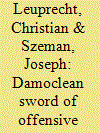

|
|
|
|
|
| Summary/Abstract |
Cyberspace is a new domain of operation, with its own characteristics. Cyber weapons differ qualitatively from kinetic ones: They generate effects by non-kinetic means through information, technology, and networks. Their properties, opportunities, and constraints are comparable to the qualitative difference between conventional and nuclear weapons. New weapons and their target sets in a new domain raise a series of unresolved policy challenges at the domestic, bilateral, and international levels about deterrence, attribution, and response. They also introduce new risks: uncertainty about unintended consequences, expectations of efficacy, and uncertainty about both the target’s and the international community’s response. Cyber operations offer considerable benefits for states to achieve strategic objectives both covertly and overtly. However, without a strategic framework to contain and possibly deter their use, make state and non-state behavior more predictable in the absence of reciprocal norms, and limit their impact, an environment where states face persistent attacks that nonetheless fall below the threshold of armed conflict presents a policy dilemma that reinforces collective insecurity.
|
|
|
|
|
|
|
|
|
|
|
|
|
|
|
|
| 2 |
ID:
156908
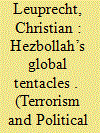

|
|
|
|
|
| Summary/Abstract |
That terrorists, criminals, and their facilitators exploit the global marketplace is well known. While the global movement of illicit goods is well documented, robust empirical evidence linking terrorism and organized crime remains elusive. This article posits Network Science as a means of making these links more apparent. As a critical case study, Hezbollah is quite possibly the most mature globalized terrorist organization, although it thinks of itself as the “Party of God.” However, the means seem to justify the ends: this article shows that Hezbollah’s holy men have no qualms about resorting to pornography, contraband cigarettes, immigration fraud, and credit card fraud to raise funds. Beyond establishing links, Social Network Analysis reveals other important characteristics, such as the relative autonomy from Hezbollah headquarters that local fundraising networks enjoy. That finding implies a paradigm shift: Hezbollah is no less a terrorist organization than an organized crime syndicate. This is apparent in a network’s structure. Transnational Organized Crime is typically about nodes being connected to many others in the network. Yet, Hezbollah fundraising networks allow such connectivity because of the group’s typically high levels of mutual trust and familial relationships. This creates a vulnerability that can be exploited by law enforcement and intelligence organizations.
|
|
|
|
|
|
|
|
|
|
|
|
|
|
|
|
| 3 |
ID:
164375
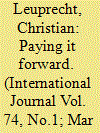

|
|
|
|
|
| Summary/Abstract |
Although the dissolution of the Soviet Union may have altered the founding Cold War rationale for NATO, the fundamental principle of the transatlantic alliance has prevailed for 70 years: the collective defence of shared interests. In the face of Russian aggression, and uncertainty about US continued commitment to the alliance, reinforcing NATO has emerged as Canada's top expeditionary defence priority. Indeed, just before the NATO summit in July 2018, Prime Minister Justin Trudeau renewed Canada's commitment to the enhanced Forward Presence (eFP) as the Framework Nation for Latvia for four years, and scaled up Canada's contribution to the allied battlegroup. This decision is as much a reflection of the eFP's immediate collective defence requirements in Latvia as it is of the extent to which the existential fate of Canada's most important defence asset hangs in the balance: the alliance, Canada's role in it, and the future of Canadian defence policy.
|
|
|
|
|
|
|
|
|
|
|
|
|
|
|
|
| 4 |
ID:
172175
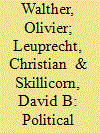

|
|
|
|
|
| Summary/Abstract |
Drawing on a collection of open source data, the article uses network analysis to represent alliances and conflicts among 179 organizations involved in violence in North and Western Africa between 1997 and 2014. Owing to the fundamentally relational nature of internecine violence, this article investigates the way the structural positions of conflicting parties affect their ability to resort to political violence. To this end, we combine two spectral embedding techniques that have previously been considered separately: one for directed graphs that takes into account the direction of relationships between belligerents, and one for signed graphs that takes into consideration whether relationships between groups are positive or negative. We hypothesize that groups with similar allies and foes have similar patterns of aggression. In a region where alliances are fluid and actors often change sides, the propensity to use political violence corresponds to a group’s position in the social network.
|
|
|
|
|
|
|
|
|
|
|
|
|
|
|
|
| 5 |
ID:
109144
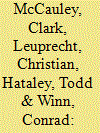

|
|
|
|
|
| Publication |
2011.
|
| Summary/Abstract |
A 2008 poll of 430 Ottawa Muslims found predominantly negative views of the U.S. war on terrorism, including the war in Iraq and the war in Afghanistan. This poll also assessed approval of Western powers (U.S., Canada, Israel, United Nations) and challengers of Western power (Al-Qaeda, Hamas, Hizballah, government of Iran). Surprisingly, attitudes of Ottawa Muslims toward militant Muslim groups were unrelated to their attitudes toward Western governments. Discussion suggests that this pattern, if confirmed in other Muslim polls, would mean that the war of ideas against radical Islam must address not one target but two: favorable opinions of militants and unfavorable opinions of the U.S. Muslims who come to like the West more may not like Muslim militants any less.
|
|
|
|
|
|
|
|
|
|
|
|
|
|
|
|
|
|
|
|
|